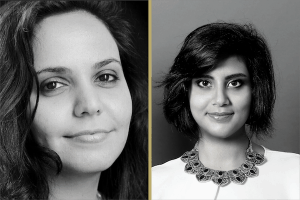2019 PEN/Barbey Freedom to Write Award: Nouf Abdulaziz, Loujain Al-Hathloul, Eman Al-Nafjan

Eman Al-Nafjan and Loujain Al-Hathloul
Nouf Abdulaziz’s photograph is not publicly available, for privacy and safety reasons.
Nouf Abdulaziz, Loujain Al-Hathloul, Eman Al-Nafjan
2019 PEN/Barbey Freedom to Write Award Honorees
At the 2019 PEN America Literary Gala, PEN America will honor imprisoned writers Nouf Abdulaziz, Loujain Al-Hathloul, and Eman Al-Nafjan with the 2019 PEN/Barbey Freedom to Write Award.
Writer-activists Nouf Abdulaziz, Loujain Al-Hathloul, and Eman Al-Nafjan have been subjected to imprisonment, solitary confinement, and torture by the Saudi Arabian government as part of its brutal crackdown on individuals who raise their voices in defense of women’s rights in the Kingdom. In May and June 2018, just as the government was lifting the ban on women driving, many activists who had campaigned against the ban and for women’s rights were arrested. Among those detained were journalist, blogger, and activist Nouf Abdulaziz; activist and social media commentator Loujain Al-Hathloul; and blogger, columnist, and activist Eman Al-Nafjan. That the Saudi government would reform the driving law and simultaneously put those who had called for such reforms in prison makes clear their actual motive: to silence dissent and prevent these women’s powerful voices from being heard.
“The fleeting hope that generational transition in the Saudi leadership would open the door toward greater respect for individual rights and international law has collapsed entirely, with individuals paying the highest price as the government resorts to rank barbarism as a blunt means to suppress and deter dissent. These gutsy women have challenged one of the world’s most notoriously misogynist governments, inspiring the world with their demand to drive, to govern their own lives, and to liberate all Saudi women from a form of medieval bondage that has no place in the 21st century. We are proud to honor these drivers of change—Nouf Abdulaziz, Loujain Al-Hathloul, and Eman Al-Nafjan—for their fearless words and actions, and to send a strong signal that international pressure on the Saudi Kingdom to respect dissent and adhere to international norms of free expression will not relent.”
—Suzanne Nossel, PEN America Chief Executive Officer
Key Writing
—The letter Nouf Abdulaziz wrote and gave to a friend to be published in the event of her arrest.
—Loujain Al-Hathloul’s blog, commenting on the criticism she received for her activism.
—Eman Al-Nafjan’s article in Foreign Policy, “What Do Saudi Women Want?”
FREE EXPRESSION IN SAUDI ARABIA
The world’s attention has recently, and rightly, turned to Saudi Arabia as a result of the brutal and horrific murder of Washington Post columnist Jamal Khashoggi by government agents in the Saudi consulate in Istanbul on October 2, 2018. The Saudi government’s disregard for human rights, however, is nothing new. Saudi Arabia, an absolute monarchy, is one of the most restrictive countries in the world, but conditions have worsened even further under de facto ruler Crown Prince Mohammed Bin Salman. Although the Crown Prince initially styled himself as a ‘reformer,’ he has overseen a vast crackdown on all forms of opposition and dissent. In November 2018, the CIA concluded that the Crown Prince ordered the assassination of Jamal Khashoggi. In a Washington Post column dated May 21, 2018, in which he wrote about the arrests of activists, Khashoggi wrote: “The message is clear to all: Activism of any sort has to be within the government, and no independent voice or counter-opinion will be allowed. Everyone must stick to the party line.”






